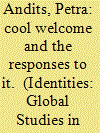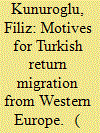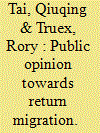|
|
|
Sort Order |
|
|
|
Items / Page
|
|
|
|
|
|
|
| Srl | Item |
| 1 |
ID:
153227


|
|
|
|
|
| Summary/Abstract |
This article examines the social aspects of Australian-Hungarians’ return to Hungary after the collapse of communism. I suggest that one of the most disillusioning aspects of homecoming for this group of Australian-Hungarians was the cold welcome they received from those who had stayed behind. The main task of this article is to analyse how returnees grappled with the negative attitudes of the stayees. Three major strategies are identified by means of which returnees facilitated their feeling of belonging: contestation, acceptance or dismissal of stayees’ perspectives. Returnees’ efforts to achieve a sense of belonging suggest that the nature of national membership is fundamentally fragile and porous and underlines that self-definitions are far from being either unconditional or ascribed. By placing contrasting narratives side by side, this article draws attention to the intersubjective elements involved in defining belonging.
|
|
|
|
|
|
|
|
|
|
|
|
|
|
|
|
| 2 |
ID:
122659


|
|
|
|
|
| Publication |
2013.
|
| Summary/Abstract |
An increasing number of ethnic Chinese students born in Venezuela return to mainland China each year to study the language of their ancestors, Mandarin. This article examines how they expose themselves to multiple discourses of 'identity', develop a reflexive strategy to cope with a multi-layered identity and act out their identity in China. In order to do so three core topics - culture, language, and identity will be analyzed and elucidated. In today's world, different forms of mobility affect the negotiation of identity and belonging. Besides migration or the physical/corporeal mobility of people there are other forms of mobilities such as the mobility of commodities, the flows of information, ideas and beliefs, financial mobility as in the case of remittances, virtual travel through Internet. These mobilities intersect and affect different discourses of language, identity and culture. The identity and sense of belonging of this group will be elucidated in four interconnected realms of social life: (1) family, (2) school, (3) fashion and popular culture, (4) food practices.
|
|
|
|
|
|
|
|
|
|
|
|
|
|
|
|
| 3 |
ID:
159337


|
|
|
|
|
| Summary/Abstract |
This article explores return migration motivations of different generations of Turkish migrants returning from Germany, the Netherlands and France, using semi-structured face-to-face interviews among 48 informants. The study draws on a qualitative approach and inductive content analysis to get insight into how pre-return, migration and transnational experiences of Turkish migrants influence their decisions to return to Turkey. It was found that an ambition to return to Turkey already present when migrating from Turkey, perceived discrimination in Western Europe and a strong sense of belonging to Turkey play the most important role in return decisions.
|
|
|
|
|
|
|
|
|
|
|
|
|
|
|
|
| 4 |
ID:
161833


|
|
|
|
|
| Summary/Abstract |
Using data from a rural household survey in China in 2009, we examine the impact of parental migration on children's educational outcomes. Consistent with the findings of a large empirical literature, we find that parental migration has a significantly negative impact on left-behind children's educational outcomes as measured by test scores in Chinese and math. But unlike much of the existing studies on the subject, we focus on the remediation effect of return migrant parents on once left-behind children's performance. This empirical strategy allows us to avoid the endogeneity issue concerning the migration decision that may have contaminated previous studies. We find evidence that return migrant parents help alleviate the harms caused by parental migration, and the remediation effect is stronger for children attending middle schools, and stronger for daughters. We also find suggestive evidence that return migrant parents improve children's performance through increases in after-school study time and education-related expenditures, following the return of migrant parents.
|
|
|
|
|
|
|
|
|
|
|
|
|
|
|
|
| 5 |
ID:
142574


|
|
|
|
|
| Summary/Abstract |
China has adopted preferential measures in hopes of luring back overseas talent, but what determines individual attitudes towards returning migrants and policies promoting return migration? This paper addresses this question using an original survey experiment of Chinese netizens. We argue that attitudes towards return migration are driven by two competing perceptions: on one hand, skilled migrants are widely thought to have beneficial effects on the local economy; on the other, domestic citizens may be wary of policies that offer elite returnees excessive benefits. The findings imply that the CCP may face a delicate trade-off between the economic benefits of return migration and the social costs of increasing inequality.
|
|
|
|
|
|
|
|
|
|
|
|
|
|
|
|
| 6 |
ID:
109113


|
|
|
| 7 |
ID:
164857


|
|
|
|
|
| Summary/Abstract |
“[L]abor-market reintegration is a complex and uneven process for return migrants.” Sixth in a series on social mobility around the world.
|
|
|
|
|
|
|
|
|
|
|
|
|
|
|
|
| 8 |
ID:
102250


|
|
|
|
|
| Publication |
2010.
|
| Summary/Abstract |
After two decades of rural-to-urban labour exodus, an increasing trend of urban-to-rural labour counterflow has also occurred in China*. This paper discusses the economic performance of return migrants with data from a survey conducted in Wuwei County in 2008. We identify the characteristics of return migrants, record their occupational change patterns, and examine their current self-employment activities. A comparative approach with non-migrants is used throughout the paper.
|
|
|
|
|
|
|
|
|
|
|
|
|
|
|
|
| 9 |
ID:
151732


|
|
|
|
|
| Summary/Abstract |
This article analyzes the experiences of female marriage migrants who have returned to their home communities in Vietnam and Mongolia after escaping from their marriages in South Korea. It examines how these women returnees experience the transnational production of legal precarity during the processes of divorce and return migration. National marriage migration policies and institutions that determine the conditions of precarity are not confined to the sovereignty of a territorially circumscribed state but are transnationally extendable, affecting the lives of marriage migrants long after they have returned to their home countries where they suffer from various forms of liminal legality. This article discusses how women become separated or divorced, how they arrive at a legally ambiguous status, and what limits their capacity to be reintegrated into their home countries. A new transnational framework for legal assistance is urgently required to find solutions to the problems faced by marriage migrant women and their children.
|
|
|
|
|
|
|
|
|
|
|
|
|
|
|
|
| 10 |
ID:
155124


|
|
|
|
|
| Summary/Abstract |
This article explores situations in which forced migrants revisit places and homes they had fled from, drawing on research carried out among Kashmiri Hindus, better known as Pandits, who were displaced following the outbreak of conflict in Jammu and Kashmir in 1990. Due to the breakdown of law and order, selective attacks, and a climate of fear, most of the community had relocated from the Kashmir valley to the south in Jammu and to even cities such as New Delhi, constituting one of the most prominent groups of Internally Displaced Persons in the region. While there is an interest in repatriation/resettlement in scholarship and policy, the experiences of the Pandits reveal the multiple meanings ‘return’ holds for the displaced. This article will draw on the experiences of Pandit forced migrants in Jammu who have returned to visit Kashmir. Their experiences will be situated with work on return migration, the Kashmir conflict, and the political location of the Pandits in the region. The article argues that return migration is an inconclusive phenomenon that critically raises questions of home and uncertainty, and provides a way to understand how the displaced locate themselves in the world.
|
|
|
|
|
|
|
|
|
|
|
|
|
|
|
|
|
|
|
|
|